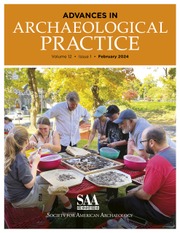Article contents
Mental Health and the Field Research Team
Published online by Cambridge University Press: 11 March 2021
Abstract
Due to the intellectual, physical, and emotional demands of field research, those doing this work need to strategies to monitor and maintain their own mental health before, during, and after a field season. Moreover, they should have a framework for supporting their colleagues. This review article will present a framework for assessing the mental health hazards and the reactions, both positive and negative, to fieldwork. First, it will use U.S. epidemiology to show that most field teams are at risk. Second, it will frame the field season both as a workplace and wilderness exposure event and discuss the elements of the field research environment that can be therapeutic for some but toxic for others. Third, it will discuss the psychological impacts of travel and reintegration as they are pertinent to the practice of archaeology. Research will be presented in order to guide evidence-informed policies for the field research team to improve the mental-health readiness and resiliency of the research team. Last, it will provide guidance on how to manage the anxiety caused by separating from social media platforms.
Debido a las demandas intelectuales, físicas y emocionales de la investigación de campo, quienes realizan este trabajo necesitan estrategias para monitorear y mantener su salud mental antes, durante y después de una temporada de campo. Además, tendrían también que contar con una estructura de apoyo para sus colegas. Este artículo presenta un esquema para evaluar los peligros para la salud mental y sus consecuencias, tanto positivas como negativas, para el trabajo de campo. Primero, se tomará como modelo la epidemiología en los Estados Unidos, para mostrar que la mayoría de los equipos de campo se encuentran en riesgo. Segundo, se enmarcará la temporada de campo como lugar de trabajo y como situación de contacto directo con la naturaleza, y se discutirán los elementos del entorno de investigación de campo que pueden ser terapéuticos para algunos, pero tóxicos para otros. En tercer lugar, se discutirá el impacto psicológico de los viajes y la reintegración, pues son pertinentes para la práctica de la arqueología. La investigación se presentará con el objetivo de orientar las políticas basadas en evidencias, a fin de que el equipo de investigación de campo mejore la preparación de su salud mental y su capacidad de recuperación. Por último, se brindará orientación sobre cómo manejar la ansiedad provocada por el distanciamiento de las plataformas de redes sociales.
Keywords
- Type
- Article
- Information
- Advances in Archaeological Practice , Volume 9 , Special Issue 1: Health and Wellness in Archaeology: Improving Readiness and Response , February 2021 , pp. 10 - 22
- Copyright
- Copyright © The Author(s), 2021. Published by Cambridge University Press on behalf of Society for American Archaeology
References
REFERENCES CITED
- 14
- Cited by


